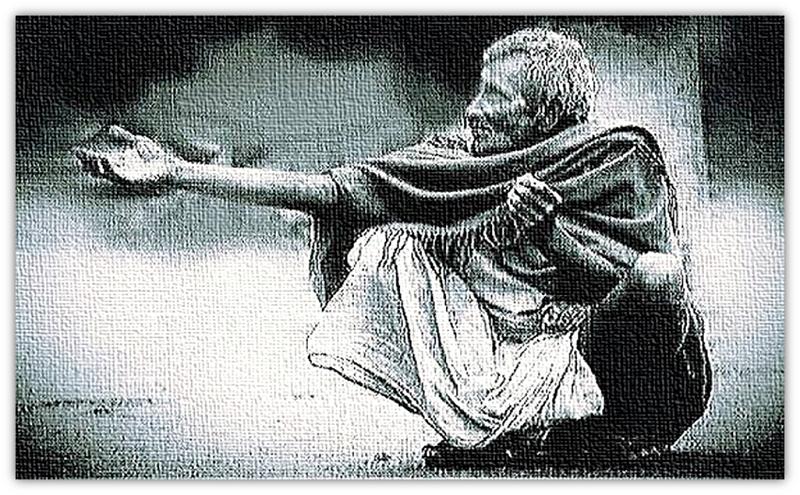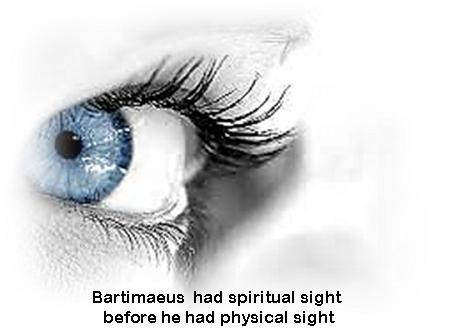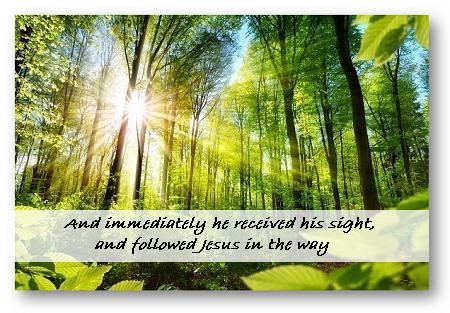The Healing of Bartimaeus
The Healing of Bartimaeus
Read Mark 10:46-52 and Luke 18:35-43

On His last journey through Jericho, Christ had merciful dealings with two very different people: Bartimaeus and Zaccheus. The city afterward had two glorious trophies of what the powerful grace of Christ can do. We wish to see what this looked like for the first of these two: Bartimaeus.
A Blind Beggar⤒🔗
There were multitudes of pilgrims surrounding Jesus, but Scripture focuses our attention on one man, Bartimaeus. Mark explains that his name means “son of Timaeus.” Timaeus literally means “honorable” or “highly prized,” reminiscent of the words of Isaiah 43:4:
Since thou wast precious in my sight, thou hast been honorable, and I have loved thee.
Yet as Scripture depicts him, Bartimaeus is a man without honor. Let’s survey some of the things he needed.
-
He needed money. That’s the message his stretched-out hand indicated. He had to beg for the basic necessities of life. In our culture, those who are blind are able to work in various capacities and able to live independent or semi-independent lives. This would have been different at this time in history.
-
He needed help. Because of his condition, people needed to lead him by the hand, tell him where the roads were, where the doors were, and so on.
-
He needed mercy from people around him. Though his condition was not because of something he had done wrong, he needed to live off the mercy of others around him.
- He needed sight. If he had sight, he wouldn’t need to beg. He would probably have been able to get along without people’s help.
It’s sad to see so many in our world in situations as miserable as this, but far greater misery is shared by everyone throughout the world – the lack of spiritual sight. The eyes of our soul are blinded because of sin. We used to walk in the light of life in fellowship with our Creator; however, when we fell from Him in disobedience, the light of our understanding was darkened (Eph. 4:18). By nature, we are all spiritually helpless and hopeless. We lack the riches we once had, and in its place there is poverty, shame, and disgrace.
In a way, Bartimaeus was better off than we are by nature, because at least he knew he was blind! By nature, none of us realizes our spiritual blindness – and that is the worst part of our misery. We imagine that we see fine, that our eyes aren’t bad; we don’t realize the spiritual darkness we are under, and therefore no one by nature is begging for spiritual things as Bartimaeus did for his sight. Instead, like the Laodiceans, we live as if we were “rich, and increased with goods, and have need of nothing,” not realizing that we are “wretched, and miserable, and poor, and blind, and naked” (Rev. 3:17). The truth is, we are profoundly in need of light, of life, of faith. And faith was one thing that Bartimaeus had (Luke 18:42).

A Believing Cry←⤒🔗
Jesus made clear that Bartimaeus actually had spiritual sight before he had physical sight. Let’s learn a number of things about the faith of Bartimaeus for a moment.
-
Bartimaeus believed that Jesus was the promised Messiah. This is clear in verses 36-38. At a certain point, a multitude passed by Bartimaeus and he asked what was going on. We don’t know what all Bartimaeus had heard about Jesus, or what he all knew from the Old Testament about the coming Messiah, but he knew enough to call Him the Son of David, which was a way of referring to the coming Messiah, promised to come from the lineage of David.
-
Bartimaeus had a hearty persuasion that Christ could give him the mercy he needed. The Lord tested Bartimaeus’s faith as He does in the life of all believers. The word in the original makes clear that, although Jesus did not seem to hear him at first, Bartimaeus kept on crying, perhaps ten minutes or more. Christ even allowed the crowds of people to “rebuke him that he should hold his peace” (Luke 18:39). However, none of these obstacles could prevent Bartimaeus from crying out for mercy. Often, there are obstacles in the way to Christ, and we can sometimes become disheartened. Yet, like Jacob at Peniel, we need to keep saying to the Lord: “I will not let thee go, except thou bless me” (Gen. 32:26).
Bartimaeus had learned a few things from begging by the roadside. He had learned that his hand had to be out there, in the face of people. His misery had to be obvious to them. He had to use his ears to hear footsteps and his other senses to be able to judge when people were near. He wasn’t trying to put on a good front; if he did, people wouldn’t give him anything. He didn’t need to uphold his own sense of dignity. In fact, he just had to throw his misery out there without apology, without excuse – as nasty as it was – and if someone would have mercy, he would help him; and if not, then not. There was nothing to lose but everything to gain.
- Bartimaeus had the faith that made the Lord Jesus stand still. True faith will always end up at the feet of the Savior. We don’t know at what moment the Holy Spirit worked faith in the heart of Bartimaeus, but clearly the Father had sent the Spirit and the Spirit had opened the closed heart of Bartimaeus, softening his will and making him to need mercy. That is clear when we compare John 6:44. And Christ rewarded the faith of Bartimaeus by standing still to hear and answer this poor beggar’s cries.
A Merciful Savior←⤒🔗
These are truly amazing words: “And Jesus stood still” (Mark 10:49). The Son of God stood still in Jericho upon the cry for mercy. He didn’t stand still to rebuke the beggar. He didn’t stand still to command him to be carried away. He didn’t stand still to give him a few coins to make it through the week. Instead, we read, “and commanded him to be called” (Mark 10:49). Christ wanted Bartimaeus in front of Him so He could show Him the mercy of God. No wonder the people said, “Be of good comfort, rise; he calleth thee” (Mark 10:49). When a believer has Christ’s name on his lips, Christ has his name on His lips. Christ not only acknowledged Bartimaeus’s cries, He would answer them directly, face to face with Bartimaeus.
Bartimaeus obeyed the Lord’s call immediately and eagerly. We read that he cast away his garment (Mark 10:49). Anything that would impede our immediate running to Jesus needs to go. Christ’s words drew Bartimaeus right to Himself.
Next, Christ inquired into what it was that Bartimaeus wanted from Him. Many would be content if Christ would give them an easier life, some help with their problems, more comfortable circumstances, etc. When the Lord brings us to Himself, we can and may ask Him for any and all things in accordance with His will. However, our most important need is His light so that our spiritual blindness is taken way (see Rev. 3:18).
The first thing Bartimaeus saw was not the flowers or trees, or even the sun; it was his great Physician’s face. He looked upon the true Son of Honor Christ Jesus. He looked at the One who had made the trees and the flowers, but also was willing to walk the whole way of suffering, past Jericho, and on to Calvary, to shed His blood for Bartimaeus and countless others like him. Because of His work on the cross, there would be light for them that sit in darkness. Because of Calvary, Psalm 34:5 could be true: “They looked unto him, and were lightened: and their faces were not ashamed.”
It is hardly a surprise that Bartimaeus wanted to follow Jesus. “And immediately he received his sight, and followed Jesus in the way.” We don’t know whether Bartimaeus watched while Christ hung from the cross or witnessed Him after the resurrection, but we do know that every believer needs and finds mercy from Christ crucified and risen. He still stands still in the gospel, calls for sinners, and bestows mercy full and free.

Questions←⤒🔗
- What did the prophets predict Messiah would do with the blind (see e.g., Isa. 42:6-7)? How was Bartimaeus better off than many who are spiritually blind today?
- Bartimaeus faced a number of hindrances. What hindrances can spiritual beggars meet with today in or around them?
- Notice how wide open Christ’s question is for Bartimaeus (Luke 18:41). What does this say about Christ’s heart for spiritual beggars? What sorts of things may we ask from Him today?
- Why do you think Jesus said what He did about faith in Luke 18:42? How might that be useful to Bartimaeus later on as well as believers today?
- Compare Luke 18:43 with John 10:4. What connection do you see and what does this say about all those to whom Christ gives spiritual light?

Add new comment